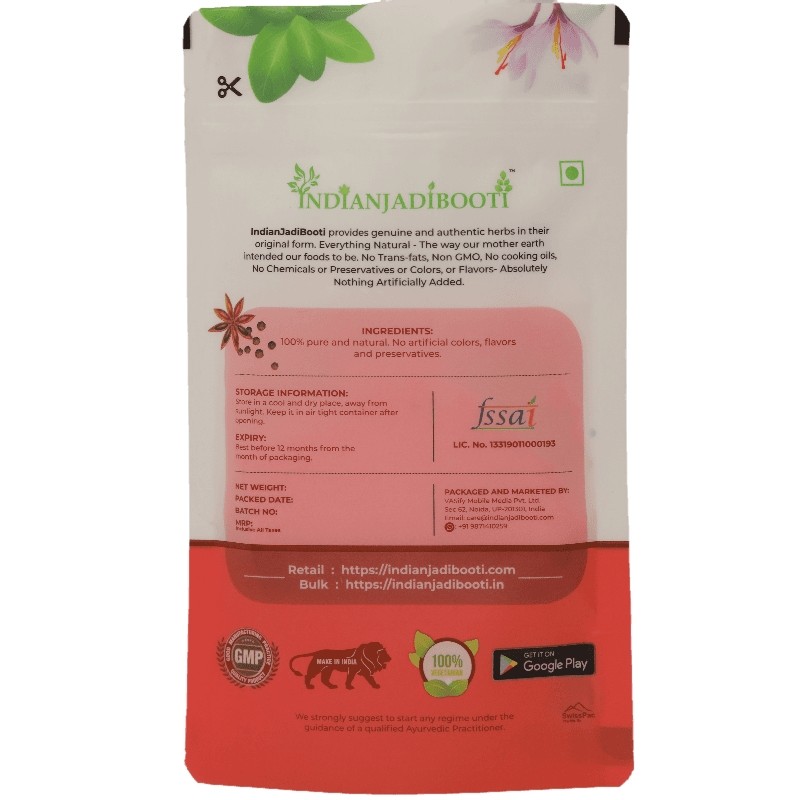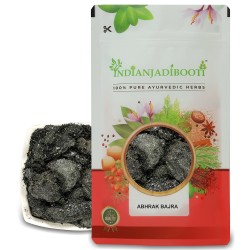

















- Stock: In Stock
- SKU: HERB000008
- Shipping: Free within India upto 10KG
- Quality: Premium Herbs with No Adulteration
- Delivery: Within 3 to 7 Working Days in India
- Shipping: From Delhi based Facility
- Transport Charges for 25KG and above: Extra on To Pay
- COD Available: Max Limit: 2 Kg and Rs 3500 per order
- Discount on Prepaid Orders: Rs 50/- off. Auto Apply on Checkout.
Available Options
Description
Artemisia vulgaris, commonly known as mugwort, is an herbaceous plant with a long history of being highly esteemed in different societies for its medical and aesthetic advantages. Its versatile uses in improving health and beautification have earned it a revered status from ancient traditions to contemporary herbal practices.
Health benefits:
Rich in nutrients and Vitamins:
Mugwort contains vital nutrients like vitamin A, vitamin C, calcium, potassium, and magnesium. These nutrients play a key role in promoting overall health, aiding in functions such as immune support, bone health, and skin rejuvenation.
Digestive aid:
In the past, mugwort was utilized to enhance digestion and relieve digestive issues such as bloating, indigestion, and stomach cramps. Its inherent bitterness triggers digestive fluids, assisting in improved nutrient absorption and more seamless digestion.
Stress relief and relaxation:
Mugwort's aromatic qualities are great for inducing relaxation and lowering stress levels. It is commonly utilized in aromatherapy to soothe nerves, relieve anxiety, and enhance the quality of sleep, assisting people in attaining a feeling of tranquility and wellness.
Beauty benefits:
Anti-inflammatory properties:
Mugwort has anti-inflammatory properties that can reduce inflammation inside and outside the body. Its topical application can calm skin irritations, eczema, and minor burns, offering relief and supporting the healing process.
Enhances Skin health:
Mugwort is highly respected in skin care for its capacity to revitalize the skin. It contains abundant antioxidants that fight free radicals, which lead to early aging. Consistent use of products infused with mugwort can reduce fine lines, enhance skin elasticity, and encourage a more radiant complexion.
Hair care benefits:
Mugwort contributes to the health of hair as well. Its ability to fight fungi and bacteria aids in addressing scalp infections and dandruff and its nourishing qualities help reinforce hair follicles and encourage better hair growth. Introducing mugwort extracts into hair care regimens can result in glossier, more resilient hair.
Here are some of the names it goes by in different states:
● Hindi: Afsanteen
● Bengali: Tite pati
● Gujarati: Kali Jiri
● Kannada: Devadanti
● Malayalam: Ponnanganni
● Marathi: Maka
● Tamil: Muka
● Telugu: Nallajada
Wrapping up, mugwort, also known as Artemisia vulgaris, emerges as a flexible herb with many advantages for health and beauty. Whether it's ingested as a tea, used on the skin, or included in skincare and hair care regimens, mugwort presents a natural way to improve health and support a glowing appearance. Its extensive background and ongoing significance in herbal medicine highlight its lasting appeal and effectiveness in contemporary health approaches.
For Detailed Benefits, Please Read-Benefits of Wormwood- Afsanteen
Other Names: Afsantin, अफसंतीन, Madderwort,Absinth, Wormwood, Green Ginger, Southernwood, Uruvalu, Urigattige, Mastiyara, Afsanteen Rumi, Nagadamini, Damar, Indhana, Mastaru, Kashuth Roomee, Damseesah, Artaamaasiyaa, Ifsinteen, Afsanteen, Armoise amère, Genépi, Vermouth, Wermut, Absinth, Bitterer Beifuss, Wurmkraut,Artemisia absinthium, Marwah, Afstiyun, Afsantin, Afsanteen, Artemisia Absinthium, Artemisinin, Afsanteen, Artemisia Absinthium, Wormwood, Afsateen, Afsateen, Afsantin, Worm Wood, Mugwort, Nagdona, Majtarimastaru, Artemesia, Artimisia, Mugwort, indianjadibooti afsanteen artemisia absinthium wormwood raw herbs, Adsantin, Afsantin, Green Ginger, Madderwort, Artemisia Vulgaris, Warmwood, Mugwart, Damanaka, Nagdon, Nagdona, Naagdon, Damnak, Tite Pati, Titepati, Nagdaun, Nagdauna, Mughwort, Damanak, Nagdoun, Nagadoun, Sweet Wormwood, Nagdaman, Nagdouna, Davan, Davana, Dhavanam, Davanam
Reviews
96% Customers recommend this product
-
5 Awesome88.89%
-
4 Great7.41%
-
3 Average3.7%
-
2 Bad0%
-
1 Poor0%
Reviews Over Afsanteen (Panchang) - Damanaka - Nagdon - Mugwort - Wormwood - Artemisia Absinthium - Green Ginger - Madderwort - Artemisia Vulgaris by IndianJadiBooti
- (4.85)
Total Reviews (27)
click here write review to add review for this product.
-
(0)
-
(0)
-
(0)
-
(0)
-
(0)
Report this review.

What is Afsanteen

-
Afsanteen, known as Artemisia absinthium or Wormwood, is a perennial herb famous for its distinct bitter taste and therapeutic properties. It has been used for centuries in traditional medicine across various cultures, primarily known for its role in digestive health and as a natural remedy for various ailments.
Afsanteen is a traditional remedy for loss of appetite.
The herb helps regulate cycles and alleviates cramps, making it a valuable natural remedy for balance and health.
Afsanteen’s antimicrobial and antifungal properties help protect the body from infections by boosting the immune system.
Afsanteen is often used as a detoxifying agent, helping to cleanse the body by flushing out toxins, especially from the digestive system and liver.
Health Benefits of Afsanteen

Anti-Parasitic Properties
Afsanteen is widely used to combat intestinal parasites like worms. It works by disrupting the life cycle of these parasites and expelling them from the digestive tract, making it a powerful natural remedy for deworming. Read More

Liver Detoxification
Afsanteen supports liver health by stimulating bile production, aiding in the detoxification process, and improving overall liver function. This helps eliminate toxins and supports better digestion and metabolism. Read More

Anti-Inflammatory Effects
The herb's potent anti-inflammatory properties make it effective for managing conditions like joint pain, and other inflammatory ailments, providing relief and improving mobility.

Mental Clarity and Relaxation
Afsanteen's mild sedative effects help alleviate anxiety and stress, enhance mental clarity, and improve sleep quality, making it a natural solution for emotional well-being and relaxation.
How to Use Afsanteen

Herbal Tea
Take 1 teaspoon of dried Afsanteen leaves or flowers.
Add to 1 cup of boiling water.
Steep for 5–10 minutes, then strain.

Powdered Form
Grind dried Afsanteen leaves into a fine powder.

Decoction
Boil 1 teaspoon of dried Afsanteen leaves in 2 cups of water until the liquid reduces to 1 cup.
Strain and allow to cool.
FAQ
Mugwort tea has a strong, herbal flavor with a slightly bitter and aromatic taste.
It is often described as having a slightly medicinal or earthy quality. Overall,
the taste of these teas can be influenced by factors such as the quality of the herbs,
brewing time, and personal preferencesIt is possible to take too much mugwort. While no studies define safe consumption
limits, research shows that taking a lot of mugwort can lead to miscarriage,
nausea, vomiting, and nervous system damage. 2 Consult with your healthcare
provider and read the product's instructions before using mugwortInfusion: 1-2 teaspoons Mugwort in 1 cup of freshly boiled water. Steep covered
10-15 minutes. Strain and drink 3 times a day. Due to its bitterness, it is a good
idea to combine Mugwort with other flavorful herbs like Lavender
(Lavandula officinalis), Lemon Balm (Melissa officinalis), or Ginger
(Zingiber officinale).Wormwood serves as a remedy for various digestive issues, including diminished appetite, stomach discomfort, gallbladder disorders, and intestinal cramping. Additionally, this herb is employed to address fevers, liver conditions, and parasitic infections. It is also utilized to enhance libido, act as a general tonic, and promote perspiration.
The chemical thujone, present in its oil, may be toxic. When wormwood oil's thujone stimulates the central nervous system, it can trigger convulsions and other harmful effects.
The plant wormwood contains thujone, a substance that can be harmful if consumed in large quantities, potentially causing hallucinations and convulsions. In the United States, regulations require wormwood products to be free of thujone. This information is based on the Food and Drug Administration's list of food additive statuses.
People should be cautious about the potential liver damage associated with using products that contain Artemisia annua extract.
Wormwood has the ability to nourish himself using Fertilizers. He receives immediate healing based on the Manure Nutrient value, while the Compost nutrient value provides him with healing over time.
Primarily employed for ailments of the liver, gallbladder, and stomach, wormwood also serves to eliminate intestinal parasites, which explains its common name. It can be utilized independently or in combination with other herbal remedies. The plant contains bitter components and is employed to enhance appetite. Historically, this herb has been used to encourage menstrual flow.
Wormwood (Artemisia absinthium) stands out as a notable medicinal plant with a long history of use. This herb produces a variety of compounds, including essential oil, bitter sesquiterpenoid lactones, flavonoids, and lignans. Wormwood is recognized for its diverse therapeutic properties, such as antiprotozoal, antibacterial, antifungal, anti-ulcer, hepatoprotective, anti-inflammatory, and immunomodulatory effects.
Nature has gifted us with various plants that serve as natural remedies. Among these is the African wormwood, a member of the Artemisia family. This bush is known by different names in various languages: mhlonyane in Zulu and Xhosa, lengana in Tswana, and wildeals in Afrikaans. African wormwood is recognized for its potential benefits in supporting respiratory health.
Artemisia capillaris mitigates skeletal deterioration by enhancing osteoblast mineralization and inhibiting osteoclast formation and bone degradation.
Wormwood poses a risk to kidney health and may elevate the likelihood of renal failure. Individuals with sensitivities to plants in the Asteraceae family, such as ragweed and marigolds, might also experience allergic reactions to wormwood, as it belongs to the same botanical group.
Rosemary offers benefits for various hair types, ranging from enhancing scalp health to reducing hair loss and encouraging hair growth. Similarly, Mugwort, also referred to as Artemisia vulgaris or Wormwood, provides a natural and safe method to boost overall hair health and stimulate growth.
In Turkish traditional medicine, santonicum serves as a remedy for diabetes [9]. Artemisia annua, commonly referred to as sweet sagewort, sweet annie, sweet wormwood, or annual wormwood (known as Qinghao in Chinese), is utilized for its medicinal properties in East Asian countries, particularly China and Korea.





-250x250.jpg)










